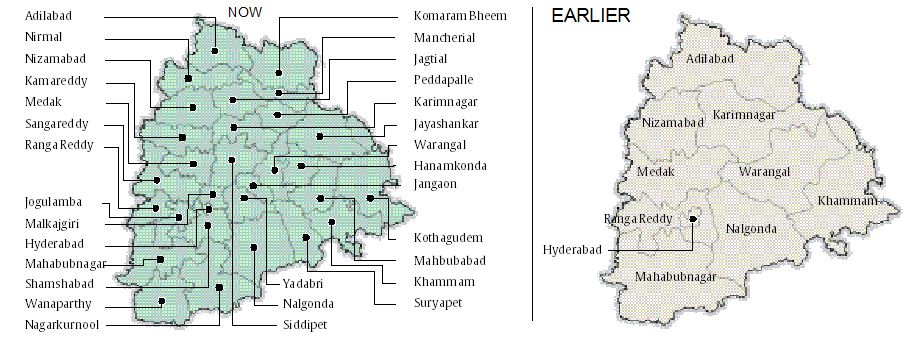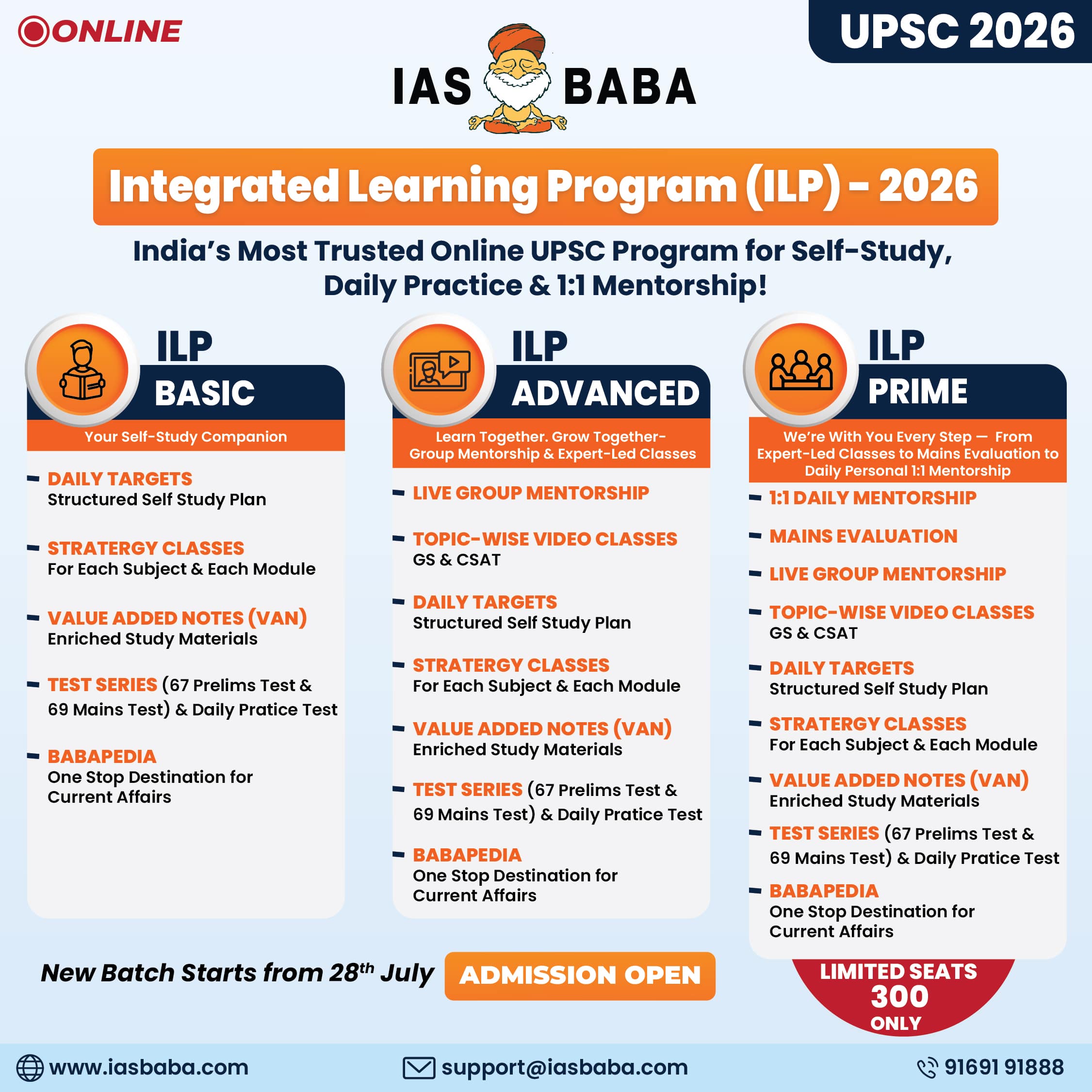IASbaba's Daily Current Affairs Analysis, IASbaba's Daily Current Affairs Oct 2016, International, National, UPSC
Archives
IASbaba’s Daily Current Affairs – 14th October, 2016
NATIONAL
TOPIC: General Studies 2
- Parliament and State Legislatures – structure, functioning, conduct of business, powers & privileges and issues arising out of these.
- Government policies and interventions for development in various sectors and issues arising out of their design and implementation.
Telangana- Small administrative units for better administration?
In news: Telangana now has 31 districts from previously 10 districts. But the important question arises is if smaller units can actually help in better administration or not.
Background:
- During 2014 elections, the Telangana Rashtra Samiti had promised creation of 14 new districts.
- After it came to power, the Chief Minister initially agreed for issuance of notification for 17 new districts. Ultimately, due to protests, agitations and demand for new districts, four more were added.
- New additions in state
- 21 new districts
- 25 additional revenue divisions
- 125 new mandals
- 4 new police Commissionerates
- 23 new police subdivisions
- 28 new circles
- 91 more police stations

Picture Credit: http://images.indianexpress.com/2016/10/telangana-division.jpg
What is being done?
- The Telangana Planning Department officials are assigning unique numerical code to all the districts, mandals and villages afresh.
- The Telangana State Remote Sensing Application Centre (TRAC) earlier prepared maps for all the districts, a prerequisite for giving the district code pending release of standard maps by the Survey of India.
- The unique numerical code for districts and mandals is important because of the financial implications and required for Central programmes like NREGA where funds would be directly released into accounts of beneficiaries based on authenticated code.
- Planning Department officials said unlike in the past where the focus was on data collection, now the focus would be on resource mapping in each mandal and accordingly the mandal-level officers were re-designated as Mandal Planning and Statistical Officers.
Small units = Better administration
- Facilitate better monitoring of beneficiaries of various government schemes like housing schemes, pensions, education and others.
- Provides more even distribution of resources. The population division on various criteria is known and thus funds are dispersed as per requirement.
- Local inputs into framing of development work. A bottom-up approach to development that allows local stakeholders greater say in decision-making on issues directly affecting their lives.
- The emerging small units will help police in improving relationship with people. Small units make police accessible to people easily.
- As per the CM of Telangana, adopting the model of small districts will boost development and take administration closer to the people.
The idea was to break down the existing districts into smaller ones – each with a population of not more than four lakh. This way, the district collectors, who manage the district administration, will be able to serve the people better.
Small units = Better administration is not true
- Increased costs due of creation of additional administrative infrastructure, transfer of personnel, and replication of paperwork.
- Initially, existing staff is redeployed and existing buildings are utilised for administrative purposes which creates pressure on human resources as well as assets.
- Telangana government has sanctioned Rs. 1 crore for each district for initial arrangements, which will hardly suffice.
- Increasing bureaucratic work at the village level will not automatically lead to better governance outcomes.
Thus, not all are buying the reasoning of better administration for creation of such small districts in Telangana. It is said that the formation of districts is more of political decision than administrative one. The agitation in Jangaon, Sircilla and Gadwal areas of Telangana changed the existing decision of creating 17 new districts to 21 new districts.
Conclusion
- Small districts, like small states, can certainly prove to be good models of governance, but without proper planning and preparation, this new experiment stands exposed to vulnerabilities.
- The role of district collectors, police, judiciary and their efficiency will be known as they have smaller areas to govern. How fast the state government can appoint these government functionaries to begin administration of district remains to be seen.
- A new case study will be available on the subject of ‘Smaller Units as medium to better governance- Reality or Myth’ in a while which will provide a first-hand insight into a larger consideration of increasing more states in India for improved administration and political satisfactions.
Connecting the dots:
- Large states give political mileage but becomes administrative nightmare at times. Do you agree that larger states with small administrative units (districts) will solve multiple governance problems? Critically evaluate
- India has small states like Goa and Sikkim and large states like UP and Maharashtra. What according to you are pros and cons of large and small states? Examine.
INTERNATIONAL
TOPIC: General Studies 2
- India and its neighbourhood- relations.
- Bilateral, regional and global groupings and agreements involving India and/or affecting India’s interests
- Effect of policies and politics of developed and developing countries on India’s interests
Do not alter MFN status to Pakistan
In news: After the Uri terrorist attacks, India was undertaking many options to revert back at Pakistan and one was reviewing the MFN status given to Pakistan. The call was to withdraw the status but is it a wise choice?
The MFN status
- The General Agreement on Tariffs and Trade (GATT) was negotiated in 1947.
- GATT’s articles of agreement were signed by all its founding members—including India and Pakistan—in October 1947, and ratified the following year by both countries.
- While signing GATT, nations agreed to abide by its cornerstone principle—non-discrimination in trade relations, whereby an importing country may not discriminate against imports based on their country of origin.
- This principle of non-discrimination, articulated in Article I, is referred to by GATT as “General MFN Treatment”.
- It means that any “favour” in trade granted to another member country shall be immediately and unconditionally granted to all other member countries.
- No doubt, the terminology is confusing: MFN does not imply favouritism, but actually rules it out. More importantly, it rules out discrimination in trade against any member country.
- Now, anticipating that some countries in future would wish to pursue comprehensive economic integration with other members, GATT also permitted departures from the principle of non-discrimination and permitted for formation of preferential trade areas, example EU (Article XXIV)
- In the same spirit, GATT observed that India and Pakistan had once been an integrated economic unit, it provided exception to trade relation between India and Pakistan under article XXIV.
- In simple terms, it meant that India and Pakistan can enter into special arrangements with respect to the trade between them and enjoy closer bilateral trade relationship.
- The exception is that they would not be required to extend the same special arrangements to other GATT nations.
India-Pakistan trade relation
- It began under the GATT provisions and remained vibrant for an extended period after partition.
- In 1948-49, India accounted for around 56% of Pakistan’s total exports and 32% of its total imports. Despite the hostilities of 1948, India remained Pakistan’s largest trading partner until 1955-56.
- The trade relations nosedived with 1965 and 1971 wars.
- But, it was resumed on a limited scale after 1972 Simla Agreement was signed.
- Later, the trade between India and Pakistan took place on the basis of “positive lists” (only goods specifically on the list could be traded).
- This was illegal under GATT MFN rules and violation of art XXIV which had permitted more (not less) liberal trade than the two countries had with other GATT nations.
- When WTO was formed in 1995, India accorded MFN status to Pakistan but Pakistan has not reciprocated it till date.
What can India do?
Many experts believe that India should not revoke Pakistan’s MFN status. Here’s why
- Simple economics logic says that free trade remains the best policy even if your trading partner wishes to be more closed. As said by economist Joan Robinson, if your trading partner dumps rocks into their harbour to block entering cargo, you do not make yourself better off by dumping rocks in your own harbour.
- Trade with Pakistan is less than 1% of India’s total trade. Even Pakistan does not have significant share of India in its trade. Thus, trade policy with Pakistan will anyways not yield much result whether it is carrot or a stick.
- Offering MFN status to a trading partner is an obligation, not a choice, for WTO members. If Pakistan has not given to India, it should raise Pakistan’s non-compliance at the WTO instead of revoking.
- There is hope of peace after war. In this context, free trade may foster prosperity, peace and friendship among both nations. India should pin on this hope for future.
Thus, India can claim a moral high ground in fulfilling the WTO obligations. Revoking Pakistan’s status may give satisfaction of ‘revenge’ but, it would not reflect mature statesmanship. And considering India’s increasing role in global issues, India has to maintain high standards of respecting globally set and accepted rules.
Connecting the dots:
- What according to you is MFN? Is it important for India’s economic boost? Explain
- India has many ways to get back at Pakistan. For that, it need not undertake actions that undermine its position as emerging global leader. With respect to revoking MFN status to Pakistan, do you agree in favour of taking such actions? Give reasons
MUST READ
The alphabet soup at Goa
Dalit politics- When Jai Bhim meets Lal Salaam
India under-reported TB for 15 years: WHO
The Asian century beckons- BRICS
Reading it wrong- Photocopy case
A matter of waste
Tread carefully- Personal Law reforms
Was the spectrum auction a success or a failure?
India’s rural transformation: A myth or reality?
Food for thought
Time for meaningful business ties at Brics














